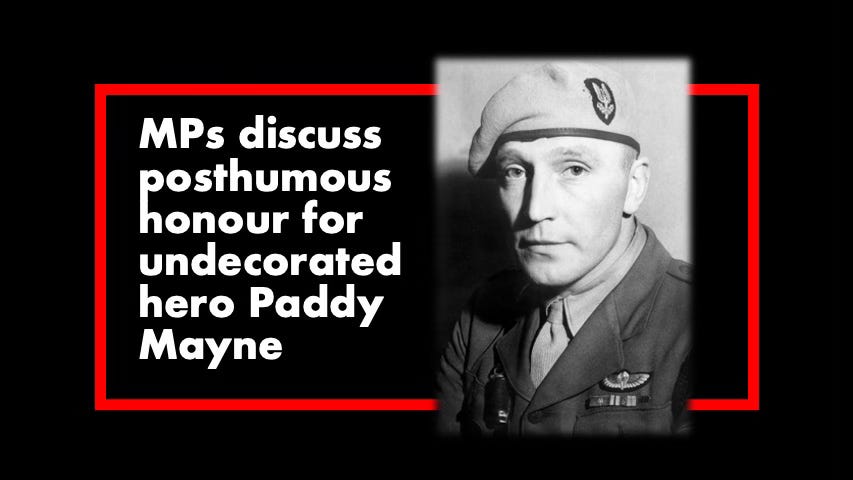Will a Hero Remain Undecorated?
Posthumous battle for Paddy Mayne’s Victoria Cross denied by military bureaucracy continues.
The House of Commons this week will consider a bid to award Lieutenant Colonel Blair "Paddy" Mayne the Victoria Cross, a decoration that has eluded the Second World War hero despite widespread recognition of his extraordinary wartime bravery.
A decorated founding member of the Special Air Service (SAS), Mayne represents a compelling case of military valour overlooked. His wartime exploits, particularly a daring rescue mission in northern Germany in April 1945, were widely regarded as worthy of recognition.
Mayne’s bravery led to him being put forward for a Victoria Cross, the highest honour the British State can bestow. Field Marshal Montgomery himself supported Mayne's recommendation, but the award was later downgraded to a Distinguished Service Order (DSO).
The exact reasons for downgrading his VC recommendation remain unclear. Official records provide no explanation, but it appears to have been a decision made by his chain of command after reviewing contemporaneous accounts.
The decision has courted much controversy and even caused a baffled King George VI to enquire as to why the Cross had “so strangely eluded him” at the time.
While Mayne certainly grated on some of his superiors in the military establishment, internal military politics alone cannot explain the reluctance to award the Cross.
Some have speculated that anti-Irish prejudice or Mayne's reputation as a maverick might have influenced the decision. He was known for his fearless but unconventional behaviour. For example, he strapped a record player to his leg while parachuting into occupied France, so he could blast the Irish ballads from his jeep as he punched through what was left ofthe German army, clearing the way for allied forces to break through on the advance to Berlin.
Such behaviour, to say the least, may not have endeared him to all members of the military hierarchy.
Post-War policy on awards would certainly be a factor. In 1946 the government reviewed all actions and campaigns that took place during World War Two and decided that after this date, no further awards would be made. This policy has been upheld by successive governments, making retrospective recognition like awarding Mayne a posthumous VC highly unlikely.
A campaign, led by Shannon, Jim a Democratic Unionist Party MP, seeks to rectify what many consider a historical injustice. Mayne, a native of Newtownards in County Down, remains a celebrated figure in Northern Ireland, commemorated through statues and civic buildings. His recent portrayal in the BBC drama SAS: Rogue Heroes has further elevated his public profile.
Despite ongoing campaigns, British military policy remains unchanging.
Mayne continues to be remembered as "the bravest man never to have been awarded the Victoria Cross" — a testament to a legacy that transcends formal recognition.
Overturning this historical decision is fraught with complexity. While Mayne undoubtedly deserved recognition, retroactively awarding the Victoria Cross risks undermining established military protocols.
Ironically, his current legendary status — remembered as the undecorated hero — might ultimately serve his legacy more powerfully than a posthumous medal.
Given his anti-authoritarian attitude, it may be the tribute he would favour.


